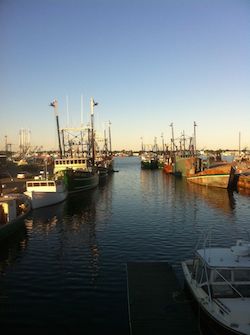The federal Bureau of Offshore Energy Management must make a stand on requiring offshore wind developers to commit to mitigation and monitoring to safeguard the $5.5 billion U.S. commercial fishing industry, the New Bedford Port Authority says in a detailed, insistent new commentary to the agency.
“BOEM has the clear statutory authority to require certain actions and hold developers to standards as part of” granting permits for offshore wind projects, the Port Authority says in its nine-page Aug. 22 missive to BOEM Director Amanda Lefton, signed by port authority interim executive director George Krikorian Jr.
“Any ability left to the wind developers to choose their own procedures will always result in them taking the least expensive path most favorable to them, not commercial fishing.”
With its strategic location on the Massachusetts South Shore, New Bedford is in a unique position. The nation’s top-earning fishing port by value, thanks largely to the sea scallop fishery, New Bedford is also quickly evolving as a base for the 800-megawatt Vineyard Wind project, the first permitted utility-scale turbine array in federal waters.
City and port officials face a balancing of the old and new industries. In the letter to BOEM port officials stress New Bedford’s high profile in the East Coast’s 30 percent share of the U.S. industry. The port brought in $451 million in landings in 2019, including $300 million from scallops.
The port comments are in response to BOEM’s latest proposed mitigation guidelines – and clearly express a sentiment that the agency has already passed up too many opportunities to head off future problems.
BOEM has delayed far too long in planning to mitigate wind development’s impact on fisheries, and continues with an “overall lack of clarity and enforceability with the language” presented in its latest proposed mitigation guidelines, port officials wrote.
“For instance, BOEM uses the phrase ‘if necessary’ in connection with direct monetary payments for mitigation (of) fisheries losses,” the letter states. “There is no one single entity, including BOEM, that reasonably thinks such payments will not be necessary, so why is BOEM still using uncertain language in that instance?”
The Port Authority’s letter comes amid months of calls from fishing industry allies for BOEM to assert more authority in requiring impact mitigation and extended fisheries and environmental monitoring as a condition of wind developers’ permits.
“BOEM has stated repeatedly in meetings that it ‘may’ revisit mitigation if there is an ‘issue’,” port officials wrote. “What BOEM has not committed to is requiring the wind developers to stand by their assertions as to fisheries impact. BOEM has left the fishermen with the impression that it is their burden to come back to BOEM and show the need for mitigation.”
“Fishermen across the United States, and especially here in the Northeast, strongly value their way of life and the resources available to make a good, honest living. It goes without saying that there is fear of the unknown when it comes the disruptions offshore wind development will have on their industry, the letter says in closing.
The government must develop a national framework for mitigation that includes scientific, technical and economic analysis, and direct participation of fishermen, port officials wrote.
“Lastly, any mitigation discussions, which are absent from this document, must take into account the protection of the workers, on the vessels, in the processing facilities, and throughout shoreside businesses, in a sense the ‘community as a whole,’” the letter concludes.







